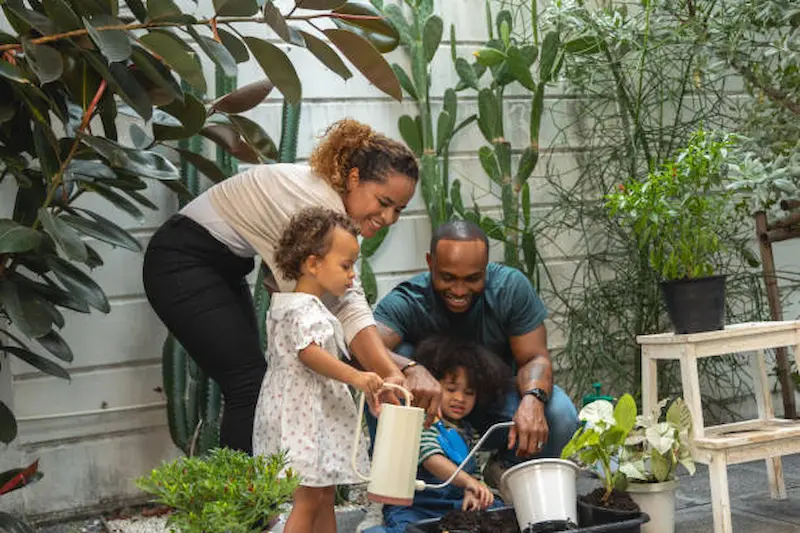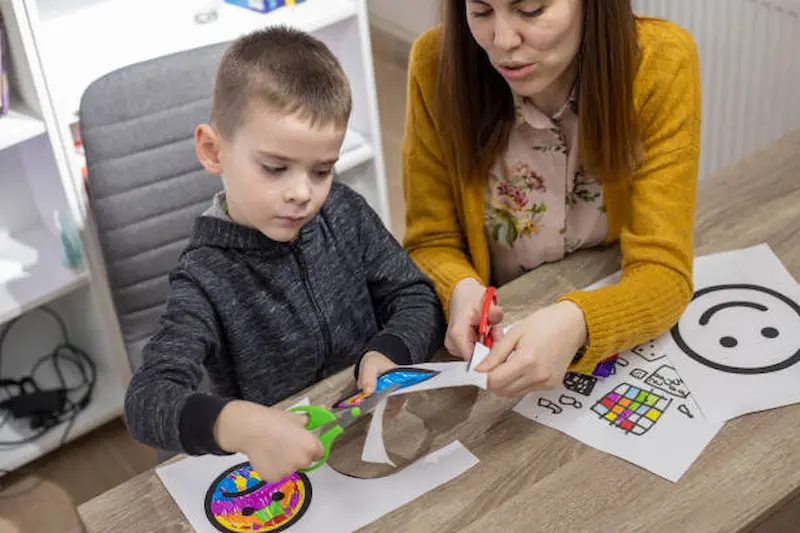Positive parenting focuses on fostering a supportive and encouraging atmosphere. It involves constructive communication, setting clear expectations, and promoting a nurturing relationship. Positive parenting emphasizes fostering a supportive and nurturing environment for children. It involves constructive communication, setting clear expectations, and encouraging healthy emotional development. By prioritizing positive reinforcement and understanding, positive parenting aims to build a strong parent-child bond and instil values that contribute to a child’s overall well-being and success.
In this blog, we explore positive parenting strategies for the teenage years, emphasizing open communication, setting boundaries, and nurturing independence. These approaches not only strengthen the parent-teen relationship but also empower teenagers with essential life skills, fostering a healthy transition into adulthood.
Table of contents
- Understanding Adolescence
- Communication Strategies
- Building Trust and Respect
- Supporting Academic Success
- Navigating Technology and Social Media
- Emotional Well-being
- Setting Future Goals
- Parenting Styles and Approaches
- Cultivating Family Time
- Positive Discipline Techniques
- Challenges in Parent-Teen Relationships:
- Handling Risky Behavior:
- Preparing for Adulthood
- Conclusion
- Frequently Asked Questions ( FAQs )
Understanding Adolescence

A. Physical Changes:
Adolescence heralds a period of rapid physical transformation. Hormonal fluctuations trigger growth spurts, changes in body composition, and the onset of puberty, shaping the individual’s physical identity.
B. Cognitive and Emotional Development:
This stage encompasses significant cognitive and emotional growth, playing a pivotal role in child cognitive development. Adolescents refine critical thinking, emotional regulation, and decision-making skills, laying the foundation for mature adulthood.
C. Peer Influence:
Peer relationships intensify during adolescence, impacting values and behaviors. Understanding and guiding these connections helps foster healthy social development.
D. Identity Formation:
Adolescents explore their identity, grappling with self-discovery and personal values. Encouraging this process with support and guidance aids in the formation of a strong, authentic sense of self.
Communication Strategies

A. Active Listening:
Active listening cultivates meaningful connections by focusing on understanding rather than responding. Encourage teens to express themselves while demonstrating genuine interest, fostering trust and mutual respect.
B. Open and Non-judgmental Dialogue:
Promote an open and non-judgmental dialogue to create a safe space for teens to share thoughts and concerns.
Avoiding criticism and embracing empathy enhances communication, strengthening the parent-teen relationship.
C. Conflict Resolution Techniques:
Teach effective conflict resolution techniques, emphasizing compromise and understanding. Equip teens with the skills to navigate disagreements constructively, fostering healthy communication patterns that will serve them well in various aspects of life.
Building Trust and Respect

Establishing trust and respect is foundational for positive relationships, including positive thinking for kids. Open communication, active listening, and consistent honesty foster an environment where individuals feel valued. Transparency about expectations and boundaries reinforces mutual understanding. Acknowledging and appreciating each other’s perspectives cultivates a culture of respect. Trust grows when actions align with words, creating a strong foundation for healthy connections in various aspects of life, be it in personal relationships, friendships, or professional collaborations.
Supporting Academic Success
A. Effective Study Habits:
Guide your teenager in developing effective study habits such as time management, note-taking, and active engagement with course material. Creating a conducive study environment and setting realistic goals contribute to sustained academic progress.
B. Balancing Extracurricular Activities:
Encourage your teenager to explore diverse interests while maintaining a balance that supports academic commitments. Involvement in extracurriculars can enhance time management skills, teamwork, and personal development when approached thoughtfully.
C. Tutoring and Homework Help:
Ensure access to resources like tutoring or homework assistance when needed. Addressing academic challenges promptly promotes a positive attitude towards learning.
D. Encouraging a Love for Learning:
Foster a genuine love for learning by connecting academic subjects to real-world applications, enhancing the overall learning experience. Celebrate intellectual curiosity, and expose your teenager to a variety of educational experiences, sparking a lifelong enthusiasm for knowledge acquisition and personal growth. By making the learning experience relevant and engaging, you not only cultivate a passion for education but also instill a sense of curiosity that extends beyond the classroom.
Navigating Technology and Social Media
Navigating technology and social media requires a balanced approach. Encourage responsible use by setting clear guidelines on screen time and content. Foster open discussions about online safety, cyberbullying, and digital etiquette. Stay informed about the platforms your teen engages with, promoting a supportive environment where they can share their experiences.
By actively participating in their digital world, you can guide them to harness the positive aspects of technology while minimizing potential pitfalls, ensuring a healthy relationship with the digital landscape.
Emotional Well-being
Prioritizing emotional well-being is crucial for overall health. Encourage self-awareness and expression of emotions, fostering resilience. Provide a supportive environment where open communication is valued, allowing for the exploration of feelings. Teach coping mechanisms and stress management techniques to equip individuals with the skills to navigate life’s challenges. By nurturing emotional well-being, individuals can cultivate a positive mindset, build strong relationships, and effectively cope with the complexities of adolescence and beyond.
Setting Future Goals

A. Career and Educational Guidance:
Offer personalized career and educational guidance to help teens identify their interests and strengths, incorporating elements like fun & educational activities for kids. Provide insights into various professions, educational paths, and necessary skills, enabling informed decisions about their future.
B. Helping Teens Explore Interests:
Encourage active exploration of diverse interests. This process not only aids in self-discovery but also helps teens develop a well-rounded perspective, enhancing their adaptability and decision-making skills.
C. Financial Responsibility:
Teach practical financial skills such as budgeting, saving, and responsible spending, including elements like finance for kids. Fostering financial responsibility empowers teens to make informed choices and develop a healthy relationship with money.
Parenting Styles and Approaches

A. Authoritative Parenting: Characterized by a balance of warmth and discipline, authoritative parents set clear expectations while nurturing their child’s independence. This approach fosters a supportive environment, encouraging positive behavior.
B. Permissive Parenting: With a lenient approach, permissive parents prioritize warmth over discipline, allowing considerable freedom, which can include fostering activities for kids. While promoting creativity, this style may lack necessary structure, potentially leading to challenges in behavioral boundaries.
Providing a balance between warmth and necessary guidelines ensures that the freedom granted is constructive and supports the child’s development.
C. Authoritarian Parenting: Marked by strict rules and high expectations, authoritarian parents emphasize obedience. However, this approach may stifle a child’s autonomy, hindering their decision-making skills.
D. Uninvolved Parenting: This style involves minimal emotional engagement and guidance, resulting in potential detachment. Children may struggle with self-regulation and face challenges in emotional development. Understanding these parenting styles helps parents tailor their approach for a balanced and supportive upbringing.
Cultivating Family Time

A. Importance of Family Bonding: Spending quality time together strengthens emotional connections, fostering a sense of belonging and support crucial for individual and collective well-being.
B. Fun and Engaging Activities: Incorporating enjoyable activities into family time enhances communication and creates lasting memories.
From game nights to outdoor adventures, these experiences contribute to a positive family dynamic.
C. Traditions and Rituals: Establishing traditions provides a sense of continuity and shared identity, grounding family members in a shared history and reinforcing values that endure across generations.
D. Encouraging Sibling Relationships: Nurturing positive sibling bonds promotes teamwork, conflict resolution skills, and emotional support, contributing to a harmonious family unit. Cultivating these aspects of family life strengthens overall resilience and happiness.
Positive Discipline Techniques

A. Natural Consequences:
Allowing natural consequences to unfold offers a valuable learning experience. By permitting individuals to face the outcomes of their actions, they develop a deeper understanding of cause and effect, fostering responsibility and sound decision-making.
B. Time-outs and Grounding:
Time-outs and grounding provide a structured space for reflection. This constructive pause allows individuals to reconsider their behavior, promoting self-awareness and reinforcing the importance of responsible actions.
C. Privilege Removal:
Temporarily removing privileges serves as a tangible consequence, emphasizing the connection between behavior and its repercussions. This approach encourages individuals to make positive choices to regain their privileges, promoting accountability.
Challenges in Parent-Teen Relationships:

Navigating the delicate balance between autonomy and guidance poses challenges in parent-teen relationships, emphasizing the importance of positive parenting. Communication gaps, generation differences, and diverging perspectives can strain connections. Overcoming these hurdles requires active listening, empathy, and fostering mutual understanding. Establishing a foundation of trust and encouraging open dialogue allows parents and teens to collaboratively address challenges, strengthening the relationship and promoting a supportive environment for adolescent development. Positive parenting practices play a crucial role in nurturing a healthy connection and fostering the growth of teenagers in a constructive and supportive manner.
Handling Risky Behavior:

Effective risk management is crucial in any endeavor. Identify potential risks, assess their likelihood and impact, and develop proactive strategies to mitigate them, promoting personal development. Encourage a culture of transparency and open communication to promptly address risky behavior. Implement clear policies and consequences to deter such actions. Regularly review and update risk management plans to adapt to changing circumstances, fostering a responsible and accountable environment. This approach not only safeguards objectives but also contributes to the ongoing personal development of individuals within the context of risk assessment and mitigation.
Preparing for Adulthood
Preparing for adulthood involves imparting essential life skills. Encourage financial literacy, effective communication, and decision-making. Provide opportunities for practical experiences, fostering independence. Explore career interests and educational paths to guide future endeavors, including educational guidance. Cultivating resilience and adaptability equips individuals for the challenges and opportunities that come with adulthood.
By offering guidance and support in these crucial areas, you empower young individuals to embark on their journey into adulthood with confidence and competence.
Conclusion
Positive parenting strategies for the teenage years involve active communication, setting clear expectations, and fostering a supportive environment. Encouraging independence while maintaining boundaries helps teens develop crucial life skills. Benefits include stronger parent-child relationships, enhanced decision-making skills in teens, and a foundation for responsible behaviour as they transition into adulthood.
Elevate your child’s learning journey with BrightChamps, the leading EdTech company offering a transformative blend of robotics, financial education, and coding courses.
To get your hands on more such articles, educational content, and free resources on coding for kids, robotics courses, game development, etc., check out the BrightCHAMPS Blog Page now!
Frequently Asked Questions ( FAQs )
A1. Maintain open communication, offering guidance while respecting their independence.
Q2. What should I do if my teenager refuses to communicate with me?
A2. Be patient, create a non-judgmental space, and find alternative ways to connect.
Q3. How can I set appropriate boundaries without being too strict?
A3. Set clear and consistent expectations, allowing flexibility within reasonable limits.
Q4. When should I seek professional help for my teenager?
A4. Seek professional help if your teenager exhibits persistent emotional distress, behavioral changes, or engages in risky behaviors.


 We are an army of educators and passionate learners from BrightChamps family, committed to providing free learning resources to kids, parents & students.
We are an army of educators and passionate learners from BrightChamps family, committed to providing free learning resources to kids, parents & students.













